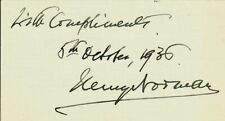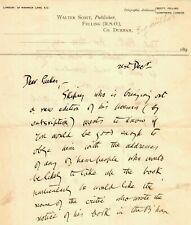When you click on links to various merchants on this site and make a purchase, this can result in this site earning a commission. Affiliate programs and affiliations include, but are not limited to, the eBay Partner Network.
Up for sale a RARE! "1st Baronet of Richmond Hill" Sir William Brown Clipped Signature Mounted.
ES-1684B
Sir William Brown, 1st Baronet DL (30 May 1784 – 3 March 1864) was a British merchant and banker, founder of the banking-house of Brown, Shipley & sat in the House of
Commons from 1846 to 1859. Brown was born at Ballymena, County Antrim, Northern Ireland on 30 May 1784. He was the eldest son of
Alexander Brown of Ballymena, and Grace, daughter of John Davison (1764–1834)
of Drumnasole. His younger brothers were George Brown (1787–1859),
John Brown (1788–1852), and James Brown (1791–1877). At twelve
years of age, he was sent with his brothers to be educated at the school of the
Rev. J. Bradley at Catterick, North Yorkshire, until
1800 when he returned to Ireland. Soon afterwards he sailed
with his father and mother for the United States of America,
and at Baltimore, Maryland, where
his father continued the linen trade in which he had been
engaged in Ireland, received in the counting-house his commercial
education. In a few years the house at Baltimore became the firm of Alexander Brown & Sons,
consisting of the father and his sons, William, John, George, and James. James
established himself at New York City and John at Philadelphia, and on the death of their father the business,
then the most extensive in the American trade, was continued by the four
brothers, George remaining in Baltimore. In 1809, William returned to the United Kingdom, established a branch of the firm in Liverpool,
and they shortly afterwards abandoned the exclusive linen business and became
general merchants. The transactions of the firm soon extended so as to require
further branches, Brown took on a partner, and the firm became known as Brown, Shipley & Co.,
Liverpool and London merchants. Brown, at one time, served as the chairman of
the Atlantic Telegraph Company. The disastrous aspect of
affairs in financial crisis of 1837,
induced the brothers George and John, who had by this time realised ample
fortunes, to retire from the firm, leaving William the eldest and James the
youngest to continue the concern. Brown persuaded the Bank of England to advance him £2,000,000 to tide matters
over in view of the firm's multiple interests. Brown only needed half the
amount, which he repaid within six months. His business, both mercantile and
banking, continued to increase, and in 1844 he was held one sixth of the trade
between Great Britain and
the United States. "There
is hardly," declared Richard Cobden at this period, "a wind that blows,
or a tide that flows in the Mersey, that does not bring a ship
freighted with cotton or some other costly commodity for Mr Brown's
house." They now became bankers in the sense of conducting transmissions
of money on public account between the two hemispheres, and in this pursuit and
the business of merchants they acquired immense wealth. In
1825, William took an active part in the agitation for the reform in the
management of the Liverpool docks. He was elected an alderman of Liverpool in 1831, and
held that office until 1838. He was the unsuccessful Anti-Cornlaw League candidate
for South Lancashire in 1844. In 1846, Brown was and held the seat until 23 April 1859. In 1856, friction arose between the British and
American governments because British consuls were enlisting recruits for
the Crimean War, but this was largely allayed by Brown, who in an
interview with Lord Palmerston, then
prime-minister, explained the objections taken in America. In 1863, he was
selected as High Sheriff of Lancashire. He
was always an advocate of free trade, and particularly favoured the idea of a
decimal currency. Sir W. Brown was the author of a pamphlet entitled Decimal
Coinage. A Letter from W. Brown, Esq., M.P., to Francis Shand, Esq., Chairman of the Liverpool Chamber of
Commerce, 1854.









